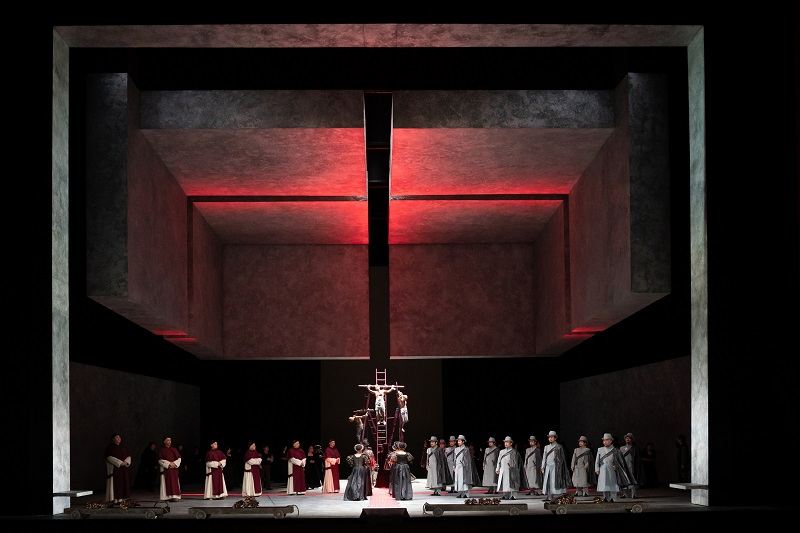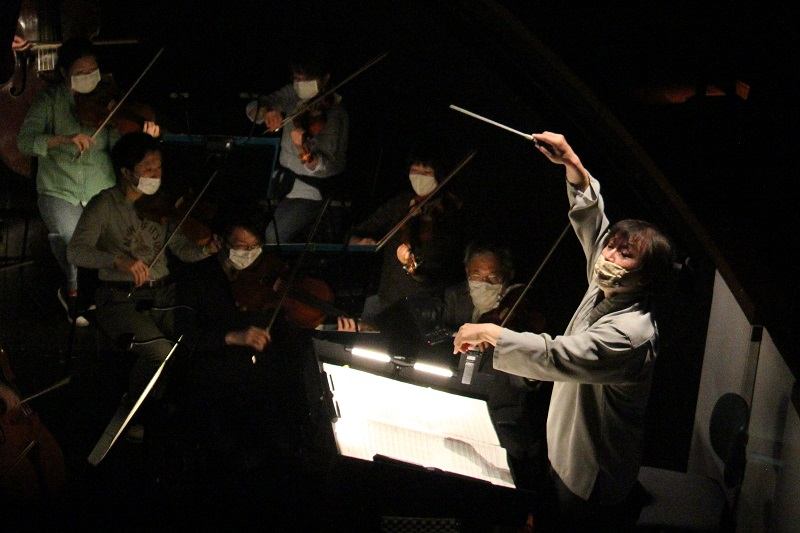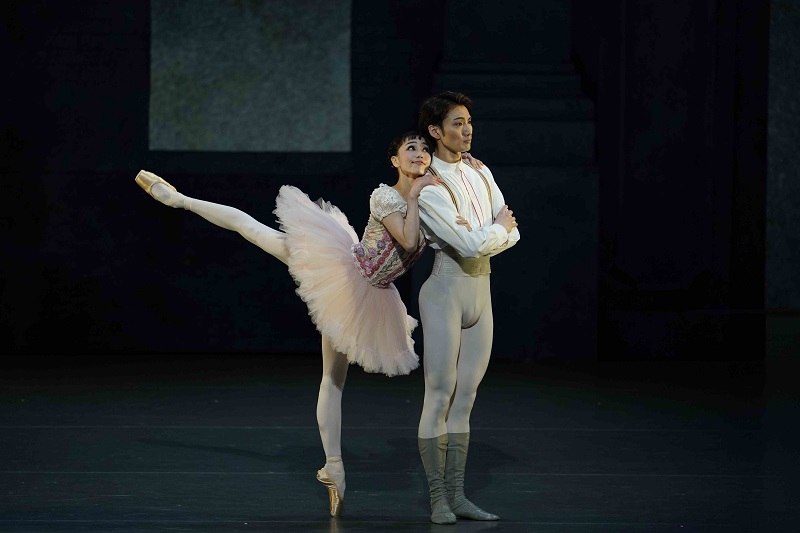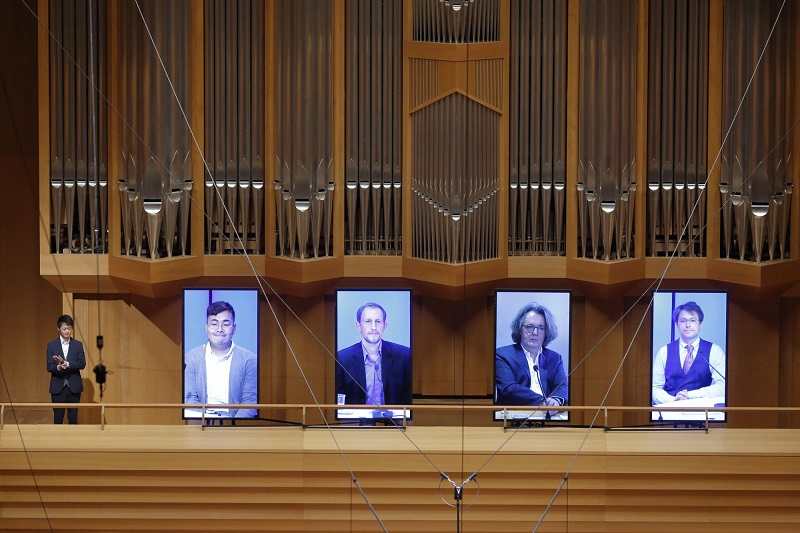
A scene from Act 2 of “Don Carlo” at the New National Theatre, Tokyo, in May with all the chorus members on stage
12:56 JST, June 29, 2021
Last year, the New National Theatre, Tokyo (NNTT) had to cancel all of the opera productions in the second half of its season due to the COVID-19 pandemic. Yet the theater has managed to stage every scheduled production so far this season, a remarkable feat considering that many opera houses around the world are still dark or have just started reopening. The NNTT has even staged three new productions, including a world premiere, in addition to six revival productions.
Arts and culture tend to be seen as nonessential and nonurgent in emergencies, but conductor Kazushi Ono, the NNTT’s artistic director of opera, disagrees.
“Humans are humans because we can be moved,” Ono said.
As if to back up his words, many of the NNTT performances this season are sold out, with tickets snapped up by opera fans craving to be inspired by arts.
Staging an opera is a magnificent enterprise involving many people, often from many countries. Stricter immigration regulations due to the pandemic mean that some of the foreign-based conductors, singers and creative staff scheduled to work at the NNTT have not been able to come to Japan or have had to be quarantined before they could join rehearsals.
When the world premiere of “A Dream of Armageddon” by Dai Fujikura was given at the NNTT in November last year, the composer, who lives in Britain, had only just finished his two-week quarantine. The other two new productions at the theater, “A Midsummer Night’s Dream” in October and a double bill of Stravinsky’s “Le Rossignol” and Tchaikovsky’s “Iolanta” in April, were created remotely using YouTube, Zoom and Skype, because the directors of both productions could not travel to Japan. The production of stage sets and props for the double bill was supervised remotely as well.
Under the stricter immigration rules imposed in late January, many singers scheduled to sing in the revival of “Die Walkure” in March were no longer available. Therefore, Ono and the NNTT scrambled to find available singers who could perform the majestic Wagner opera at a short notice. Ono came up with the idea of casting two tenors to share the main role of Siegmund in Acts 1 and 2, and soprano Atsuko Kobayashi, who stepped in to sing Sieglinde, became one of the Japanese singers who have seized the opportunity to make their names.

Kazushi Ono conducts the Tokyo Philharmonic Orchestra during a rehearsal of “A Dream of Armageddon” at the New National Theatre, Tokyo, last year.
Myriad adjustments
In this “new normal” age, both the staff and the cast must follow various new rules, such as regularly being tested for the virus. Singers must not face each other when singing and must wear gloves for contact with props and other cast members. The first three rows in the auditorium are left unoccupied to add more distance between the audience and the stage. Members of the orchestra maintain social distance from each other, and some instruments are placed on stage rather than in the orchestra pit in some productions. Ono made more than 60 changes to a reduced version of the score of “Die Walkure” to make it sound appropriately grand.
According to Yasuko Sawada, who has worked on seven NNTT productions this season as an assistant director or revival director, the big chorus scene in Act 2 of “Don Carlo” in May gave her the biggest challenge in terms of infection prevention.
“There are 81 members in the chorus, who had to be socially distanced, and they also had to act,” Sawada said.
In the original plan for the production, some of the chorus members were to sing while on a wall on the set. Sawada decided to bring them down onto the stage because singing from a high place involved a risk of droplets falling down to the stage where there were other singers. But the change meant the stage was more crowded when singers had to be socially distanced, so the large walls on the set were moved apart to give more room.
New-normal staging has sometimes produced surprising effects. Citing the NNTT’s regional tour of Mozart’s “The Magic Flute” for high school students in Kyoto in October last year, Sawada said, “As a result of socially distancing the singers, the production gained a grander perspective than the original plan. It gave me goosebumps.” As one of the most sought-after conductors today, Ono is still a busy flyer across the globe, even though a large part of his concert schedule was nullified last year. Each time he flies, he has to get tested and quarantine himself following the local rules.
“I must be the most [PCR-]tested Japanese in the world,” he said.
He criticizes some of the restrictions imposed on cultural events in Japan, such as a seating limit, saying they lack scientific support. The NNTT was allowed to sell tickets for only 50% of capacity for a prolonged period last year and while the state of emergency was in place this year. “I wonder where that 50% came from. It’s not a scientifically proven figure,” he said, commenting that Japan has not conducted large-scale concert experiments like ones carried out in Europe. In March, for example, a rock concert in Barcelona was attended by 5,000 masked people who were all tested two weeks later to see how many of them were infected.
Also, the final performance of “Lucia di Lammermoor” at the NNTT in April had to be canceled because the third state of emergency was declared that day, with only two days’ notice.
But Ono is defiantly positive about the future of music.
“I think our presence is meaningful in that we encourage people to attend live performances as much as possible, because what we do is a cultural activity essential to humans,” he said.
Now the NNTT is getting ready for its fourth new production of the season, “Carmen,” which will be premiered on July 3 to a full-capacity audience, unless the situation changes. Director Alex Olle joined the rehearsals in early June after finishing his self-quarantine.
“It will be slightly unconventional ‘Carmen’ for the new age,” said Ono, who will conduct the production that will be set in Tokyo and star Stephanie D’Oustrac in the title role. “I’m sure the singers will give passionate singing and acting [performances], as they have all gone through their own ordeal. Humans can go one step further after overcoming difficulties.”
Visit www.nntt.jac.go.jp/english/ for more information on the production.

Ayako Ono and Takafumi Watanabe perform “Coppelia” at the New National Theatre, Tokyo, on May 8.
Ballet livestreamed
The National Ballet of Japan, which is based at the NNTT, also has had its share of troubles amid the pandemic, although ballet is less affected than opera because the performers remain silent onstage. Still, the four performances of “Coppelia” in May, which took place shortly after the third declaration of the state of emergency, were given without an audience and were livestreamed for free.
The streaming had about 167,000 views overall.
“I was genuinely pleased that it became a good opportunity for people who can’t come to the theater because of work or living too far away to get to know our company,” said Ayako Ono, who danced the main character of Swanilda on May 8.
Performing without an audience posed a challenge to dancers as there is none of the applause that would be heard under normal circumstances.
“But I was just relieved that the performances were not canceled and all the four sets of cast were able to perform,” Ono said.
Takafumi Watanabe, who danced as her partner Franz, said he took extra care to make finer facial expressions and put on lighter makeup than usual because dancers’ faces could be seen up close in streaming, as on TV.
The livestreaming brought a nice surprise to Watanabe, who used to be a member of Le Ballet du Capitole in Toulouse, France. “The ballet master [of the Toulouse company] texted me saying he watched the livestream even though it was early morning in France. It was a nice surprise indeed,” he said.

From left: Kosuke Negishi, Minchang Kang, Jakob Gruchmann, judge Pascal Dusapin and Giorgio Francesco Dalla Villa participate in the “Toru Takemitsu Composition Award 2021: Final Concert” at Tokyo Opera City Concert Hall on May 30.
Remote judge for composition award
The Toru Takemitsu Composition Award, annually held at Tokyo Opera City Concert Hall in Shinjuku Ward, Tokyo, is a unique competition for contemporary composers that has only one judge every year. For the past two editions of the prestigious competition, the judge, Thomas Ades of Britain for 2020 and Pascal Dusapin of France this year, could not come to Japan because of the pandemic and remotely listened to a concert of works by the finalists.
Three of the four finalists for this year, who are based overseas, remotely listened to the performances of their works, from rehearsals onward. Only winner Kosuke Negishi, who lives in Japan, attended the concert on May 30 in person.
“Although it is a pity I could not meet Mr. Pascal Dusapin and the other finalists in person, I feel it’s significant that our works were on the same program, and that we could listen to each other’s music,” Negishi said in a video statement recorded after winning the competition. “The fact that this concert could take place under current restrictions with stringent control measures is highly significant not only for the preservation of the arts and culture, but for their development as well.”
Top Articles in Society
-

Man Infected with Measles Reportedly Dined at Restaurant in Tokyo Station
-

Man Infected with Measles May Have Come in Contact with Many People in Tokyo, Went to Store, Restaurant Around When Symptoms Emerged
-

Woman with Measles Visited Hospital in Tokyo Multiple Times Before Being Diagnosed with Disease
-

Australian Woman Dies After Mishap on Ski Lift in Nagano Prefecture
-

Foreign Snowboarder in Serious Condition After Hanging in Midair from Chairlift in Nagano Prefecture
JN ACCESS RANKING
-

Japan PM Takaichi’s Cabinet Resigns en Masse
-

Japan Institute to Use Domestic Commercial Optical Lattice Clock to Set Japan Standard Time
-

Israeli Ambassador to Japan Speaks about Japan’s Role in the Reconstruction of Gaza
-

Man Infected with Measles Reportedly Dined at Restaurant in Tokyo Station
-

Videos Plagiarized, Reposted with False Subtitles Claiming ‘Ryukyu Belongs to China’; Anti-China False Information Also Posted in Japan






















